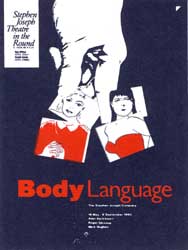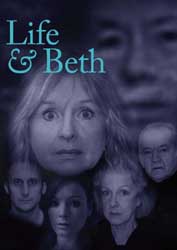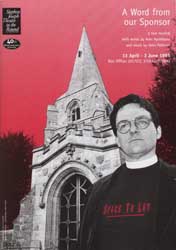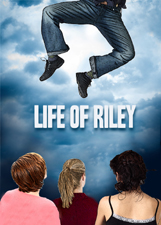
Sir Alan Ayckbourn is a prolific British playwright and director. He has written and produced as of 2024, 90 full-length plays in Scarborough and London and was, between 1972 and 2009, the artistic director of the Stephen Joseph Theatre in Scarborough, where all but four of his plays have received their first performance. More than 40 have subsequently been produced in the West End, at the Royal National Theatre or by the Royal Shakespeare Company since his first hit Relatively Speaking opened at the Duke of York's Theatre in 1967.

Way Upstream is a play by Alan Ayckbourn. It was first performed, under Ayckbourn's direction, in Scarborough, North Yorkshire, UK, "in the round" at the Stephen Joseph Theatre, on 2 October 1981. Although realistic in style, with a setting of a hired cabin cruiser on an English river, some journalists read it as an allegory of the political state of England at the time, with the violent resolution of the usurping captain's tyrannical regime taking place at "Armageddon Bridge", and crew members "Alistair" and "Emma" making a new start at the end. Ayckbourn, however, always maintained he was an apolitical writer and is on frequent record for his lack of interest in party politics; his website makes it clear that the play is not about the political state of the nation.

Woman in Mind (December Bee) is the 32nd play by English playwright Alan Ayckbourn. It was premiered at the Stephen Joseph Theatre In The Round, Scarborough, in 1985. Despite pedestrian reviews by many critics, strong audience reaction resulted in a transfer to London's West End. The play received its London opening at the Vaudeville Theatre in 1986 where it received predominantly excellent reviews.

Body Language is a 1990 play by British playwright Alan Ayckbourn. It is about two women, one thin and one fat, who have their bodies swapped as a result of a botched operation.
Living Together is a 1973 play by British playwright Alan Ayckbourn. It is one of the plays in The Norman Conquests trilogy, which together form one of Ayckbourn's most popular works.

The Revengers' Comedies is a play by Alan Ayckbourn. Its title references that of The Revenger's Tragedy. The play is an epic piece running more than five hours and was designed to be presented in two parts. It was inspired by the playwright's love of films and references many notable movies, particularly the Alfred Hitchcock classic Strangers on a Train.

Sisterly Feelings is a 1979 play by British playwright Alan Ayckbourn. It is the first of Alan Ayckbourn's plays to have alternate plotlines depending on decisions made during the plays. In this play, two sisters, Abigail and Dorcas, compete for the attention of their brother's fiancée's brother, Simon, and whoever ends up with him depends on a toss of coin for scene two, and a decision made by the actors in scene three.

Taking Steps is a 1979 farce by British playwright Alan Ayckbourn. It is set on three floors of an old and reputedly haunted house, with the stage arranged so that the stairs are flat and all three floors are on a single level.

Sugar Daddies is a 2003 play by British playwright Alan Ayckbourn. It is about a student who forms a friendship with a rich man over three times her age, who has a sinister past, and maybe a sinister present too.

A Chorus of Disapproval is a 1984 play written by English playwright Alan Ayckbourn.

Life and Beth is a 2008 play by British playwright Alan Ayckbourn. It was written as a third part of a trilogy named Things That Go Bump, uniting the cast of the first two plays: Haunting Julia (1994) and Snake in the Grass (2002). It is about a recently bereaved widow, Beth, troubled by her family's misguided support and a late husband who won't leave her alone.
Things That Go Bump is a season of plays performed in 2008 by British playwright Alan Ayckbourn.

Awaking Beauty is a 2008 musical with words by Alan Ayckbourn and music by Denis King. It was shown as the Stephen Joseph Theatre's Christmas production, but, unlike earlier productions, was expressly billed as not suitable for young children. The musical is a parody sequel to Sleeping Beauty, where the wicked witch Carabosse also falls in love with the prince, and uses her own dark magic and dirty tricks to try to make him her own.

A Word from Our Sponsor is a 1995 musical by Alan Ayckbourn and John Pattison. It was the final Ayckbourn play to be premièred at the Stephen Joseph Theatre's old Westwood site. It is about a vicar, who is tempted by the devil (Valda/Valder) offering a sponsorship deal for dubious return favours. This play was one of Ayckbourn's less successful works.
How the Other Half Loves is a 1969 play in two acts by British playwright Alan Ayckbourn. It is a farce following the consequences of an adulterous affair between a married man and his boss's wife and their attempts to cover their tracks by roping in a third couple to be their alibi, resulting in a chain of misunderstandings, conflicts and revelations. The play is known to have secured Ayckbourn's runaway success as a playwright.

Suburban Strains is a 1980 musical by British playwright Alan Ayckbourn with music by Paul Todd. This was the first attempt Ayckbourn made at a musical since the ill-fated Jeeves! in 1975. It is about a teacher, Caroline, whose marriage to actor Kevin breaks down, only to find her new partner, doctor Matthew, even worse due to his control freakery, before making up with Kevin again.
This Is Where We Came In is a 1990 children's play by British playwright Alan Ayckbourn. It is about three storytellers, Great Aunt Repetitus, Uncle Erraticus, Uncle Oblivious, who trap six players in twisted re-interpretations of fairy tales. It was originally presented as a two-parter shown on Saturday mornings, where the plays could be seen out of order, but the two parts were put together and made into a single event in Christmas 1991.

Life of Riley is a 2010 play by Alan Ayckbourn. It was first performed at the Stephen Joseph Theatre, Scarborough.

Science fiction theatre includes live dramatic works, but generally not cinema or television programmes. It has long been overshadowed by its literary and broadcast counterparts, but has an extensive history, and via the play R.U.R. introduced the word robot into global usage.















